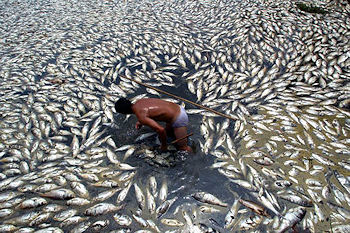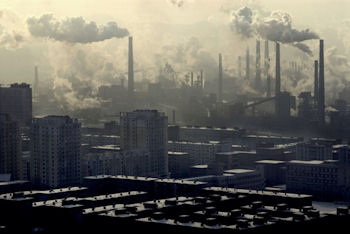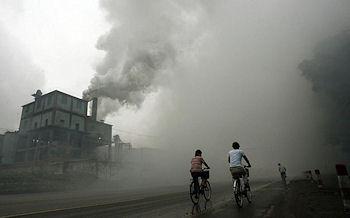Editorial comment: Excuses for the date of this blog from an economics teacher-blogger at the University of York, UK. The content seemed so very important anyway since the future of the planet is at stake now and China, being one of the world's superpowers, holds a lot of the threads in their hands that will decide if we are going to sink or swim. -SON
Hundreds of millions of people are being made ill every year or dying prematurely from pollution caused by China’s breakneck economic growth, a leading economic thinktank has concluded following an 18-month investigation.The OECD study, prepared at China’s request, draws on work by the government, World Bank and Chinese Academy of Sciences to spell out the scale of the ecological crisis now engulfing the country, poisoning its people and holding it back economically.
It says up to 300 million people are drinking contaminated water every day, and 190 million are suffering from water related illnesses each year. If air pollution is not controlled, it says, there will be 600,000 premature deaths in urban areas and 20m cases of respiratory illness a year within 15 years.
China’s water quality gives the researchers greatest concern. One third of the length of all China’s rivers are now “highly polluted” as are 75% of its major lakes and 25% of all its coastal waters. Nearly 30,000 children die from diarrhoea due to polluted water each year
They do, however, have a raft of excellent photographs. A sample:
 |
| Wuhan, Hebei province: A man collects dead fish in Donghu lake, where officials say an estimated 30,000kg of fish have been killed by a combination of pollution and hot weather |
 |
| Benxi: Pollution from steel mills blows over residential buildings |
 |
| Yutian, Hebei province: Cyclists ride through a cloud of pollution produced by a nearby factory |
Blue-green algae blooms choked Lake Taihu – China’s third biggest source of freshwater – in May, forcing 5 million people to use bottled water for drinking and bathing.
Soon after, local media were reporting outbreaks across the country. Rancid blooms contaminated Dianchi Lake in southwestern China, then Xinlicheng reservoir, the main source of water for Changchun – a northern city of almost 3 million people. In every case, pollution – either from factories, fertilizer or untreated sewage – was to blame.
Algae blooms are nature’s response to discharges of nitrogen and phosphorus. Grown to excess, they choke waterways of oxygen, killing fish and fouling the air with a putrid smell.
When prime minister Wen Jiabao visited Lake Taihu, he reportedly described it as an environmental wake-up call to the nation.
There is no out-of-sight, nor any out-of-mind, when you have bursting dams or 5 million people with algae blooms where their municipal water used to be.
High urban density living and immense populations means a political response, Party or no Party. The real question is whether it can be enough, or in time. “The Party”, considered centrally, is not party officials handing out contracts for bribes, to corrupt and incompetent factories, firms, etc. Dams will continue to break, lakes will continue to blossom with algae and dead, toxic fish, as long as there is a central government with such short arms. Even the projects upon which it does focus – cleaning Beijing for the Olympics, highways to Lhasa, the Three Gorges dam – are borderline catastrophes, both in environmental terms and potential human terms in the future.
What to do? Beats me. Their economy still grows at 10% or so per year. It still demands the resources, it still gets them overseas. It still faces massive fronts of desertification, and increasing rates of urbanisation – bringing with it increasing demands for water, housing, energy, etc. on one hand, but declining agricultural production on the other. How US trillion-dollar foreign reserves but declining faith in Chinese-made goods and (potential) political devolution work in with this can be the subject of a later post.
from The Guardian